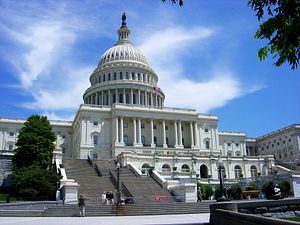In the shadow of the ongoing U.S.-China trade war, it should have come as no surprise if some analysts and policymakers in Beijing had prayed — perhaps fervently — that the Republican Party would be swamped by a blue wave in the 2018 midterm election. A Democratic win in either the House or the Senate — and preferably both — would presumably restrain U.S. President Donald Trump’s punitive impulses.
A little more than a month before the election, Trump suggested that some Chinese didn’t just pray about their preference. “Regrettably, we found that China has been attempting to interfere in our upcoming 2018 election, coming up in November, against my administration,” he declared at a UN Security Council session in late September. “They do not want me or us to win because I am the first president ever to challenge China on trade.”
Regardless of the veracity of Trump’s allegation, the election results show that Republicans didn’t suffer a “shellacking.” They lost the House but retained the Senate. What are the implications of this outcome for U.S.-China relations?
It would be naïve for Beijing to expect House Democrats to immediately and completely reverse Trump’s course. To be sure, the Democratic Party has evolved to be pro-trade under former Presidents Bill Clinton and Barack Obama. The former cajoled Congress to approve the North America Free Trade Agreement and China’s accession to the World Trade Organization, while the latter launched the now-defunct Trans-Pacific Partnership (TPP).
Nevertheless, during the 2016 presidential campaign both potential Democratic candidates, Hillary Clinton and Bernie Sanders, voiced their opposition to free trade, though the former was much milder in her condemnation than the latter. This powerfully illustrates the strong appeal of protectionism to the Democratic base. No wonder Senate Minority Leader Charles Schumer encouraged Trump to stand strong against China. “As I’ve always said, when it comes to being tough on China’s trading practices, I’m closer to Trump than Obama or Bush,” he said, following the announcement of an initial bilateral trade agreement in May this year. With this bipartisan agreement on Chinese trade, Beijing should prepare for potentially more punitive measures from the White House and/or Congress.
Apart from trade, the newly anointed House majority has another big axe to grind, and that is human rights. Trump and his fellow partisans in Congress (with the notable exceptions of Senator Marco Rubio and Representative Chris Smith) have been conspicuously silent about Chinese human rights practices. But the Democratic majority seems almost certain to break that silence.
Nancy Pelosi, who is widely expected to be the next speaker of the House (a position she held from 2007 to 2011), is one of the most outspoken congressional critics of alleged Chinese human rights violations. In the early 1990s she repeatedly introduced bills that attempted to condition China’s Most Favored Nation trade status (later renamed Normal Trade Relations) on its human rights progress. “The fight for human rights is an ethic in San Francisco, make no mistake about that,” she once said. Besides, with a Republican in the White House, Pelosi should have strong partisan incentives to raise hell about China’s human rights record. And her party’s absolute control of the House legislative agenda empowers her to make Chinese human rights a prominent issue for the 116th Congress. It is entirely possible that a willing and able Pelosi cooperates with Republicans — some of whom are also highly critical of Chinese human rights practices — to impose human rights conditions on bilateral trade.
The incoming Congress might also confront Beijing on Taiwan. Admittedly, compared with Democrats, Republicans have been more vocal in their support for the island. After the 1994 midterm elections, the newly empowered Republicans made Taiwan a top priority in their legislative agenda. They forced Bill Clinton to grant a visa to the former Taiwanese leader Lee Teng-hui in 1995, and the House passed the U.S.-Taiwan Anti-Ballistic Missile Defense Cooperation Act and the Taiwan Security Enhancement Act in 1997 and 2000, respectively. Most recently, the Republican-controlled 115th Congress passed the Taiwan Travel Act, which Trump signed into law in March 2018. Faced with this long record of unwavering Republican support for Taiwan, the new Democratic majority in the House could try to upstage Republicans by passing legislation that has no chance of becoming law but which makes them look more pro-Taiwan. Alternatively, they could work with Republicans in both chambers to pass binding legislation that provokes the Chinese leadership.
By focusing on these three major issues — trade, human rights, and Taiwan — the new Democratic majority could launch a fierce China offensive. Most important, Democrats could cooperate with Republicans on all three issues. In an era of hyper political polarization, one would normally expect Democrats and Republicans to fight against each other on nearly every issue. But China seems to be one of the few exceptions, due to an emerging consensus in Washington that getting tough on China is long overdue. To be sure, up until now there has been no consensus on how to deal with China, but this lack of agreement could be even more dangerous for U.S.-China relations, as the two parties — driven by electoral politics — might compete against each other with extremist China policies.
In the past four decades only the 1994 midterm election has had immediate and significant impact on U.S.-China relations. Apart from Taiwan (as mentioned above), the new Republican majority also launched a high-profile investigation into allegedly illegal Chinese campaign contributions and released a report that accused China of stealing America’s nuclear secrets. The 2018 midterm election is likely to produce similar congressional activism in China policy. A crucial difference between the two elections is that back in 1994 there was a consensus on engagement with China, but in 2018 there is a consensus on the failure of that engagement. Consequently this new wave of congressional activism might have decidedly more negative impact on the bilateral relationship.

































